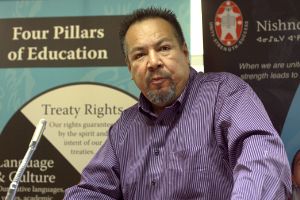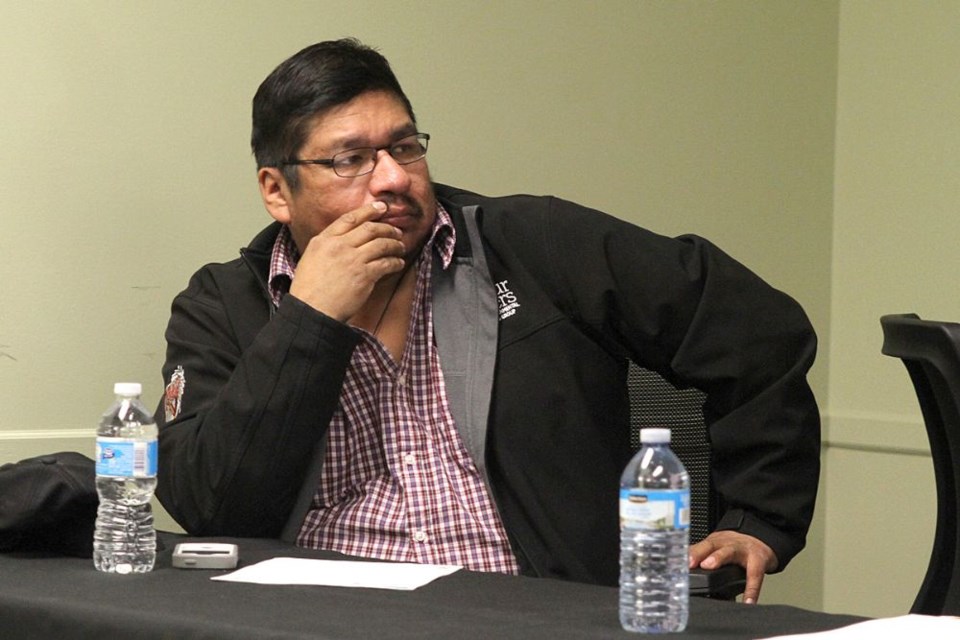THUNDER BAY -- First Nations leaders are hoping bringing attention to a health crisis in Neskantaga First Nation will focus the federal election's radar on living conditions in many First Nations.
Neskantaga Chief Wayne Moonias stood with Ontario Regional Chief Isadore Day and Nishnawbe-Aski Deputy Chief Terry Wabooseat a Toronto press conference on Monday to bring attention to Neskantaga's 21-year boil-water advisory.
Moonias suspects the children in his community are contracting skin illnesses from the water but without consistent health care support in the remote community, there's no way to know for sure.
 "Children are getting sick, our people are struggling in third-world conditions and living daily with three bottles of water per household," Moonias said.
"Children are getting sick, our people are struggling in third-world conditions and living daily with three bottles of water per household," Moonias said.
"While Canada announces their billions in surplus, our community can't access clean water. What is the priority here? Enough is enough."
There are 67 such boil-water advisories in Ontario alone, 35 of which are among the 49 communities represented by Nishnawbe-Aski Nation. Waboose pointed out Kenora MP Greg Rickford has 15 First Nations in his riding under such advisories and despite his being in cabinet, Rickford has not generated the political will to address the issue.
"I'd question what (Rickford) has done in that regard -- obviously, nothing," Waboose said.
"The previous governments have neglected First Nations because for them and for most of the general public, we're way up north. We're just somewhere. 'There's a bunch of Native people living up there in some small, isolated communities' and we're an afterthought. We're considered second or third class citizens in this country."

Waboose said it would cost $1.1-billion to upgrade water infrastructure for all communities in NAN Territory.
Instead of putting resources toward long-terms solutions, he said, families are rationed three litres per day. Marten Falls First Nation has been under a boil-water advisory for 10 years and instead of fixing water systems there, the federal government pays $10,000 per week to send bottled water to the remote community.
"The lack of infrastructure goes to a lot of the health determinants," Waboose added. "It causes a lot more illness, it causes a lot more social issues and disruptions and so it's not just the water issues. It's infrastructure. It's the lack of First Nations resources."
In Treaty 3 territory, between eight and 10 of the 28 First Nations have boil-water advisories at any given time. Those include Shoal Lake 40 First Nation, which is situated at the intake for Winnipeg's water supply, and Treaty 3 Grand Chief Warren White's community of Naotkamegwanning First Nation (Whitefish Bay).
White said a second-hand water treatment plant was installed in his community in 1985 and has broken down sporadically ever since.
"The inequities in the health care system to our people in all areas -- medical treatment , access directly in the communities, all our health services are limited," he said.
"And also, the lack of infrastructure in our communities -- potable water, the capital. They've (the federal government) made severe cuts to major capital projects. How do you make those things better when they continue to cut the funding to have these communities on safe potable water like everybody else in Canada?"
Editor’s Note: This version of the story corrects an earlier version that misidentified Chief Wayne Moonias. This version also corrects the estimated cost of infrastructure upgrades to $1.1 billion.
